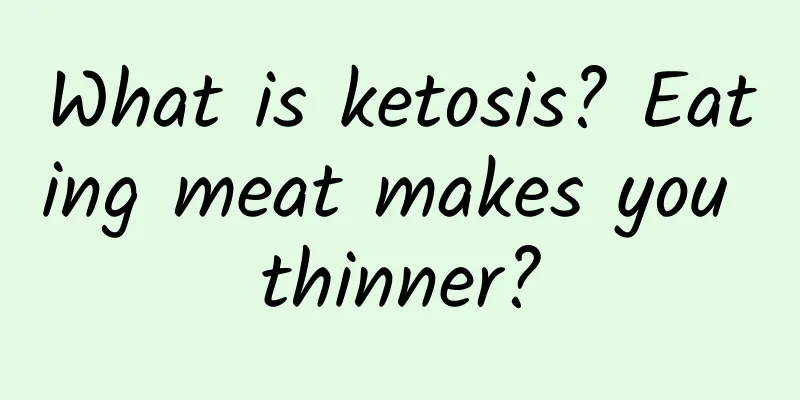What is ketosis? Eating meat makes you thinner?

|
Audit expert: Shen Yingjian Director of the Nutrition Department of Hebei Yanda Hospital When it comes to weight loss, you must be familiar with the ketogenic diet . This rumored "very effective" method, like other weight loss methods, has successful cases and loyal fans. The ketogenic diet advocates low carbon and high fat, which means you can eat a lot of meat and still lose weight? Great! Friends who prefer meat must be eager to try it. Source: pexels But don't rush to try it. In addition to considering whether it can help you lose weight, you should also consider whether it is suitable for you. 1 What exactly is the ketogenic diet? If you do a quick search online, you’ll see descriptions of the ketogenic diet similar to the following: **** “The ketogenic diet (KD) is a low-carbohydrate, high-fat, moderate-protein diet.” "The energy supply ratio of the three major macronutrients in the ketogenic diet is approximately 80% fat, 15% protein, and 5% carbohydrates." Many people may still be confused after reading this. After all, we don’t have a clear concept of “energy supply ratio” or how to calculate “high (fat)” and how to calculate “low (carbohydrate)”. Source: Pexels Perhaps we can look at how to eat a ketogenic diet through the control diet plan of the ketogenic diet group and the normal diet group in the "Epidemiological Experiment of Using Ketogenic Diet for Weight Loss": Ketogenic diet group: 30ml oil (15ml each of coconut oil and butter) plus 4g of coffee were used to make bulletproof coffee. One cup of bulletproof coffee for breakfast, and meat dishes such as butter fried eggs, twice-cooked pork, and pan-fried salmon, as well as vegetables and fruits such as broccoli and avocado for lunch and dinner. The daily carbohydrate intake was controlled at 30g, fat at 130g, protein at 60g, and total energy at around 1500kcal. Normal diet group: no restrictions on food ingredients, controlled daily carbohydrates 250g, fat 20g, protein 60g, total energy about 1500kcal. Source: pexels There is a lot of content, so let me highlight a few key points: 1. The dietary structure is very different from our daily diet: we usually mainly consume carbohydrates, such as rice, noodles, grains, potatoes, lotus roots, yam, etc., but these are almost not allowed on the ketogenic diet. "30g of carbohydrates per day" is about the size of a fist; 2. The ketogenic diet requires a high intake of fat: about five or six times what we normally consume. Meat eaters are indeed ecstatic, but if you eat like this every day, you will feel sick just thinking about it; 3. The total energy is controlled at 1500kcal: If the energy consumption is the same, then the goal of controlling weight can be achieved. Do we still need to adopt such an extreme diet as the ketogenic diet? After all, it is difficult to stick to the ketogenic diet for a long time. Now we know that the ketogenic diet has extremely strict control on carbohydrate intake, but there is basically no restriction on fat intake. So how does this nutritional ratio that is completely different from the daily diet play a role in weight loss in the body? 2 The ketogenic diet for weight loss Before exploring the weight loss principles of the ketogenic diet, it is necessary to emphasize that there are not many studies on the ketogenic diet in China and the West, so the mechanism by which it can reduce weight is analyzed based on the current limited research and the proportion characteristics of the three major nutrients. Source: Pexels We all know that although there are a variety of weight loss methods on the market, they all create a negative energy balance through various means to achieve the purpose of fat loss. The ketogenic diet is more extreme and more efficient. The ketogenic diet is called "ketogenic" because it simulates the state of hunger by strictly restricting the intake of carbohydrates, causing starvation ketosis , thereby changing the body's energy supply mode. The switch in energy supply mode will also promote the decomposition and metabolism of fat to form ketone bodies and excrete them from the body. So to put it simply, the ketogenic diet simulates the state of hunger and changes the energy supply pattern, thereby increasing the body's consumption of fat and ultimately achieving the effect of reducing fat. Such an extreme diet method that simulates a state of hunger was originally used as a medical treatment. 3 The ketogenic diet was originally used to treat epilepsy . The ketogenic diet, which is well known to the public for weight loss, was not originally used for weight loss, but for the treatment of epilepsy . This may be a little hard to imagine, after all, the two sound unrelated, but the essential connection has actually been mentioned just now, which is because the ketogenic diet simulates the state of hunger. Source: Pexels As early as 500 BC, people accidentally discovered that the number of seizures in children with epilepsy would decrease when they were hungry. Later, in the early 20th century, American doctor Hugh Conklin began to use the method of fasting but not water restriction to treat children with epilepsy, and achieved good results. Dr. Wilder of the Mayo Clinic in the United States first proposed the ketogenic diet in 1921, which can simulate the state of hunger without fasting. It has been widely used in the treatment of epilepsy. Later, many animal experiments and clinical studies also verified the efficacy of the ketogenic diet in the treatment of refractory epilepsy. The ketogenic diet was originally used to treat diseases, but now it has become popular for weight loss. Therefore, we should not try it easily before we clearly understand its harmful effects. 4 Hazards and precautions you must know Many people may say that although the ketogenic diet is a bit difficult to stick to because of the low carbohydrate intake, it is effective in weight loss, so it is worth a try. So before you try, I'd like to give you a few key points, you might as well take a look: 1. Professional guidance is needed: Through the origin and development of the ketogenic diet, it can be found that the ketogenic diet is currently mainly used for clinical research and disease treatment, and patients still need various examinations before treatment to strictly evaluate whether they are suitable for the ketogenic diet therapy. During the treatment process, professional medical staff are also required to monitor the ketone body content and other physical indicators of the patient at any time to ensure that appropriate supplements or measures can be given when ketoacidosis occurs. Therefore, when the public does not have corresponding guarantees, such as baseline physical assessment, guidance from professional nutritionists, and assistance from professional medical staff, it is really not suitable to use the ketogenic diet to lose weight. Source: Pexels 2. Adverse reactions: Current studies have found some short-term adverse reactions. The ketogenic diet may cause hypoglycemia, hunger, increased heart rate, skin itching, constipation, etc. The long-term harm is still unclear because there are few clinical studies and a lack of complete knowledge on the prevention and response to adverse reactions. 3. Consume muscle, and lose weight more and more difficult: The disadvantages of a very low-calorie diet like the ketogenic diet are also obvious: while reducing fat, muscle is also consumed, which leads to a lower and lower basal metabolism, making it more and more difficult to lose weight, and it is easy to have bottlenecks and difficult to stick to it. In clinical studies on the treatment of simple obesity with a ketogenic diet, it was found that the subjects' compliance was not high, that is, many people could not stick to the ketogenic diet for about a month at most and could not continue to participate in the experiment, and some even shorter. Source: Pexels Since the ketogenic diet is a therapy that uses fat metabolism to replace glucose as an energy source, people who suffer from fatty acid transport and oxidation disorders cannot use the ketogenic diet to lose weight. In addition, the ketogenic diet is a high-fat diet, so its method has a considerable impact on cardiovascular and cerebrovascular diseases, and is not suitable for people with cardiovascular and cerebrovascular diseases. At present, the ketogenic diet is basically used for clinical treatment and is not suitable for the general public to use for weight loss. If it is only for "weight loss", the ketogenic diet is indeed effective. However, it is not suitable for everyone. |
Recommend
Dealroom: Global AI Venture Capital Report 2025
Global AI Venture Capital In 2024, AI venture cap...
Lei Jun's interview with the audience: Xiaomi's boundaries, vision and challenges
December 17 was the day after Lei Jun’s 45th birt...
The reason why the "face plate" has become bigger has been found! (It's not because of obesity)
In daily life, have you ever felt snapping or dis...
Alipay releases Apple phone security tips: Apple users beware of fraudulent payment
[[245706]] Alipay's official Weibo account re...
The glory of the Internet giants is gone, and the A-share "Internet +" bubble may burst
Internet companies represented by Apple, Google, ...
How much does it cost to customize a food delivery app in Weihai?
The factors affecting the quotation of customized...
Can Tik Tok short videos be used for SEO?
When it comes to search, the first thing that com...
Ford conducts C-V2X test on open roads in China for the first time
From September 15 to 18, during the 2018 Wuxi Wor...
Android performance optimization: How to avoid creating unnecessary objects in Android
[[169562]] In programming development, memory usa...
The master cracked the Trojan APP and burst into laughter at the end
Everyone knows that you should not click on the l...
Why do Toutiao always know what you like to watch?
There are many apps like Toutiao and Qingmang Rea...
Stunning and stunning, how are these atmospheric wonders formed?
Produced by: Science Popularization China Author:...
It's "weight loss season" again! Qin Hao's weight loss diet is exposed. Have you found a scientific way to lose weight?
Can ordinary people imitate Qin Hao's weight ...
Tips for using the URL displayed in Baidu search promotion!
Tips for using display URL The display URL is the...
Apple releases seventh developer beta of iOS 12
In the early morning of August 14, Apple released...









